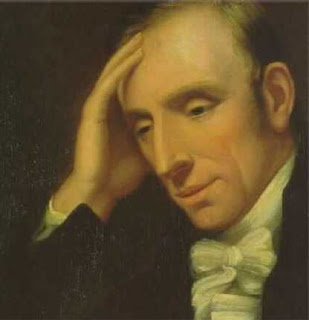"The Tables Turned"
The speaker begins by telling his friend to stop reading books; he'll become fat from being sedentary. The speaker then asks why he chooses to be so serious while outside there is a beautiful evening scene:
Up! up! my Friend, and quit your books;
Or surely you'll grow double:
Up! up! my friend, and clear your looks,
Why all this toil and trouble?
The sun above the mountain's head,
A freshening lustre mellow
Through all the long green fields has spread,
His first sweet evening yellow.
The speaker continues, telling his friend that books are dull and tedious. Rather than reading, he should venture outside to where the linnet (a small finch) and the throstle (a song bird) are singing beautiful music containing more wisdom than any book. The two lines that follow (15 and 16) are probably the most important in the poem: "Come forth into the light of things, / Let Nature be your teacher." The speaker is telling his friend that Nature has more to teach than books, and that he should go outside rather than seek refuge in dry pages:
Books! 'tis a dull and endless strife:
Come, hear the woodland linnet,
How sweet his music! on my life,
There's more of wisdom in it.
And hark! how blithe the throstle sings!
He, too, is no mean preacher:
Come forth into the light of things,
Let Nature be your teacher.
In the next two stanzas the speaker tells his friend that Mother Nature is full of wealth, and that she is ready to bestow her fruits on our minds and hearts. He also says that in nature wisdom comes from being happy and healthy, and that a person can learn more about humanity and about good and evil from a tree than from a sage:
She has a world of ready wealth,
Our minds and hearts to bless--
Spontaneous wisdom breathed by health,
Truth breathed by cheerfulness.
One impulse from a vernal wood
May teach you more of man,
Of moral evil and of good,
Than all the sages can.
The speaker suggests that even though nature brings humanity sweet traditions of intelligence, we tend to ruin that knowledge by dissecting it. Instead, we should reject traditional science and art and simply come into nature ready to learn with "a heart / That watches and receives":
Sweet is the lore which Nature brings;
Our meddling intellect
Mis-shapes the beauteous forms of things:--
We murder to dissect.
Enough of Science and of Art;
Close up those barren leaves;
Come forth, and bring with you a heart
That watches and receives.
Analysis:
"The Tables Turned" consists of eight four-line stanzas in interlocking rhymes (abab). It is in ballad form, written in iambs with four beats in the first and third lines of each stanza, and three beats in the second and fourth lines.
It certainly seems strange to find a poet telling his friend (and through his friend his readers) to stop reading, and yet much of what Wordsworth is saying in "The Tables Turned" fits perfectly with the Romantic Movement, which emphasizes the importance of being a part of nature. For Wordsworth there is much more to be learned by watching, listening to, and simply taking in one's surroundings than by studying books. At the same time, there is a strong element of irony at play here. First of all, Wordsworth is making these statements in a poem, which will become (as he knew it would) a part of a book meant to be read. Even though he believes that nature is a great teacher, he is not ready to throw away books altogether.
It is important to note the poem's title: "The Tables Turned." The title leads us to believe that Wordsworth is reacting to the status quo, or to the way that people usually think, which in this case is that books are the best way to learn. In order to make the strongest statement possible, Wordsworth goes to the opposite extreme, even though his true feelings probably lie somewhere in the middle.


